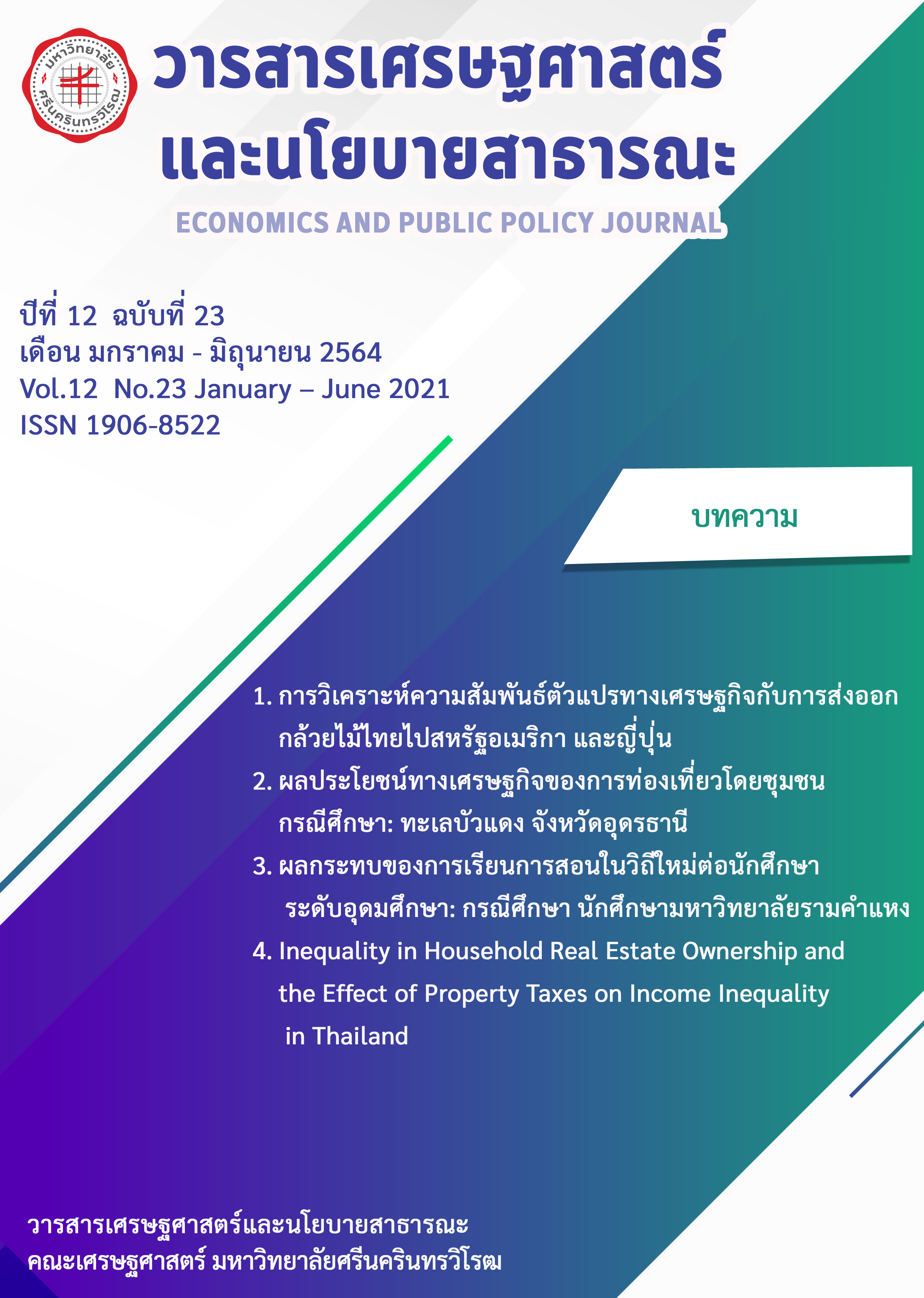Analysis of the relationship of economic variables with the export of Thai orchids to the United States and Japan.
Abstract
บทคัดย่อ การศึกษานี้มีวัตถุประสงค์เพื่อวิเคราะห์ความสัมพันธ์เชิงดุลยภาพในระยะยาวของตัวแปรทางเศรษฐกิจ และปัจจัยที่ส่งผลต่อการส่งออกกล้วยไม้ไทยไปสหรัฐอเมริกา และญี่ปุ่น ได้แก่ GDP ของสหรัฐอเมริกา และญี่ปุ่น อัตราแลกเปลี่ยน CPI ของสหรัฐอเมริกา ญี่ปุ่น และไทย โดยใช้ข้อมูลอนุกรมเวลาเริ่มไตรมาส 3 ปี 2540 ถึงไตรมาส 4 ปี 2561 โดยใช้แบบจำลอง Vector Autoregressive (VAR) ร่วมกับวิธีทางเศรษฐมิติ Co-integration, Granger Causality, Impulse Response, Variance Decomposition ผลการวิเคราะห์เชิงดุลยภาพในระยะยาวชี้ให้เห็นว่าตัวแปรทางเศรษฐกิจที่ใช้ในการศึกษามีความสัมพันธ์เชิงดุลภาพในระยะยาวทั้งการส่งออกไปสหรัฐอเมริกา และญี่ปุ่น อย่างมีนัยสำคัญ ในขณะที่ตัวแปรทางเศรษฐกิจที่ส่งผลต่อการส่งออกไปสหรัฐอเมริกา ได้แก่ อัตราแลกเปลี่ยน GDP ของสหรัฐอเมริกา CPI ของไทยและ CPI ของสหรัฐอเมริกาอย่างมีนัยสำคัญ ซึ่งแตกต่างจากการส่งออกไปญี่ปุ่นมีเพียงอัตราแลกเปลี่ยนเท่านั้น ที่ส่งผลต่อการส่งออกอย่างมีนัยสำคัญ ส่วนการวิเคราะห์ Impulse Response พบว่าหากเกิด Shock ของอัตราแลกเปลี่ยน และ CPI ของไทยส่งผลด้านลบต่อการส่งออกกล้วยไม้ไปสหรัฐอเมริกา ในขณะเดียวกันหากเกิด Shock ของ CPI ของไทยและ CPI ญี่ปุ่น จะส่งผลด้านลบต่อการส่งออกกล้วยไม้ไปญี่ปุ่นเช่นเดียวกัน การวิเคราะห์ Variance Decomposition พบว่าในระยะยาวความแปรปรวนของคาดเคลื่อนเกิดจากมูลค่าการส่งออกไปสหรัฐอเมริการ้อยละ 56.43 และร้อยละ 43.57 เกิดจากตัวแปรเศรษฐกิจที่ใช้ร่วมศึกษา ขณะที่การส่งออกไปญี่ปุ่นความแปรปรวนของคาดเคลื่อนเกิดจากมูลค่าการส่งออกร้อยละ 76.81 และร้อยละ 23.19 เกิดจากตัวแปรเศรษฐกิจที่ใช้ร่วมศึกษาคำสำคัญ : การส่งออกกล้วยไม้ ตัวแปรทางเศรษฐกิจ ดุลยภาพในระยะยาวAbstract This study aims to analysis long-term equilibrium relationships of economic variables and factors affecting Thai orchid exports to the United States and Japan, with GDP in USA, Japan, Exchange rate, CPI in USA, Japan, Thailand. The data used in this study consisted of time series during quarter 3 in 1997 to quarter 4 in 2018, using Vector Autoregressive Regressive (VAR) model with econometric tools Co-integration, Granger Causality test, Impulse Response, Variance Decomposition. The results from long-term equilibrium analysis indicated that the economic variables used in the study had a statistically significant long-term equilibrium relationship for both exports to the United States and Japan. While the economic variables that affect exports to the US are exchange rates, US GDP, Thai CPI and US CPI, different exports to Japan, there is only an exchange rate. The Impulse Response analysis showed that if the shock of the Thai exchange rate and CPI had a negative impact on orchid exports to the United States at the same time, if the shock of Thai CPI and Japanese CPI would have a negative impact on orchid exports to Japan as well. Analysis of Variance Decomposition It was found that over the long term, the variance in forecast was driven by 56.43% of the value of exports to the United States and 43.57% from the economic variables used in the study, as for exports to Japan, the variance is expected to be driven by 76.81 percent in export value and 23.19 percent from economic variables. Keyword: Orchid exports, Economic variables, Long-term equilibriumDownloads
Download data is not yet available.
Issue
Section
บทความวิจัย




